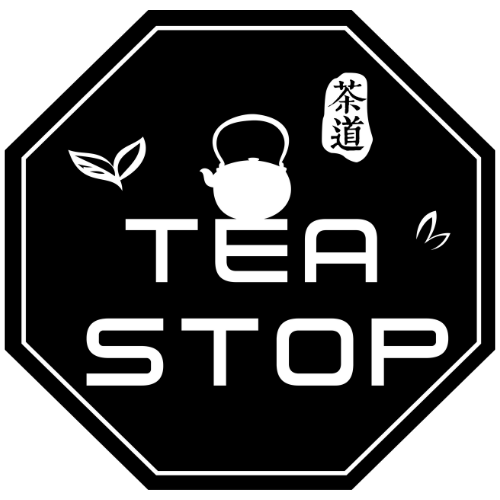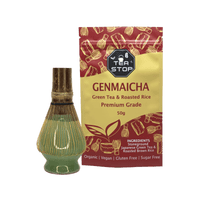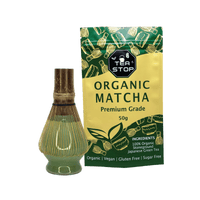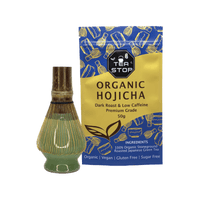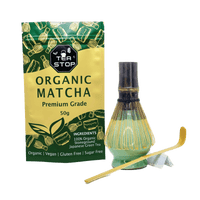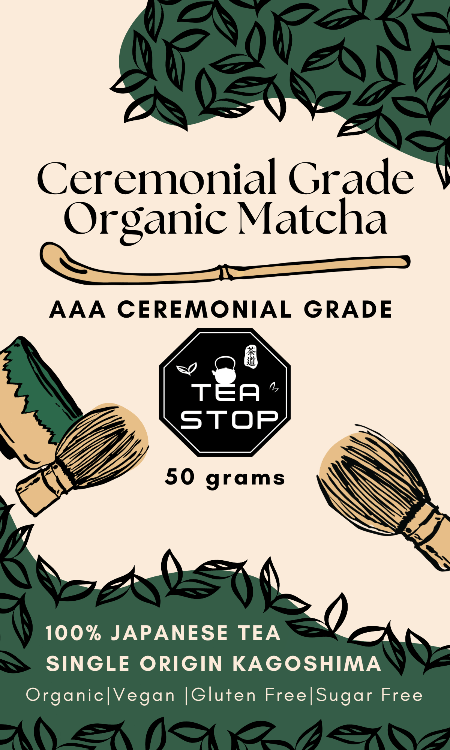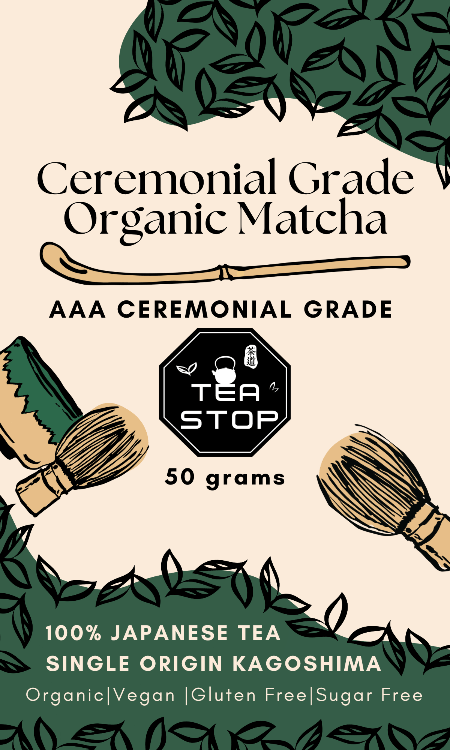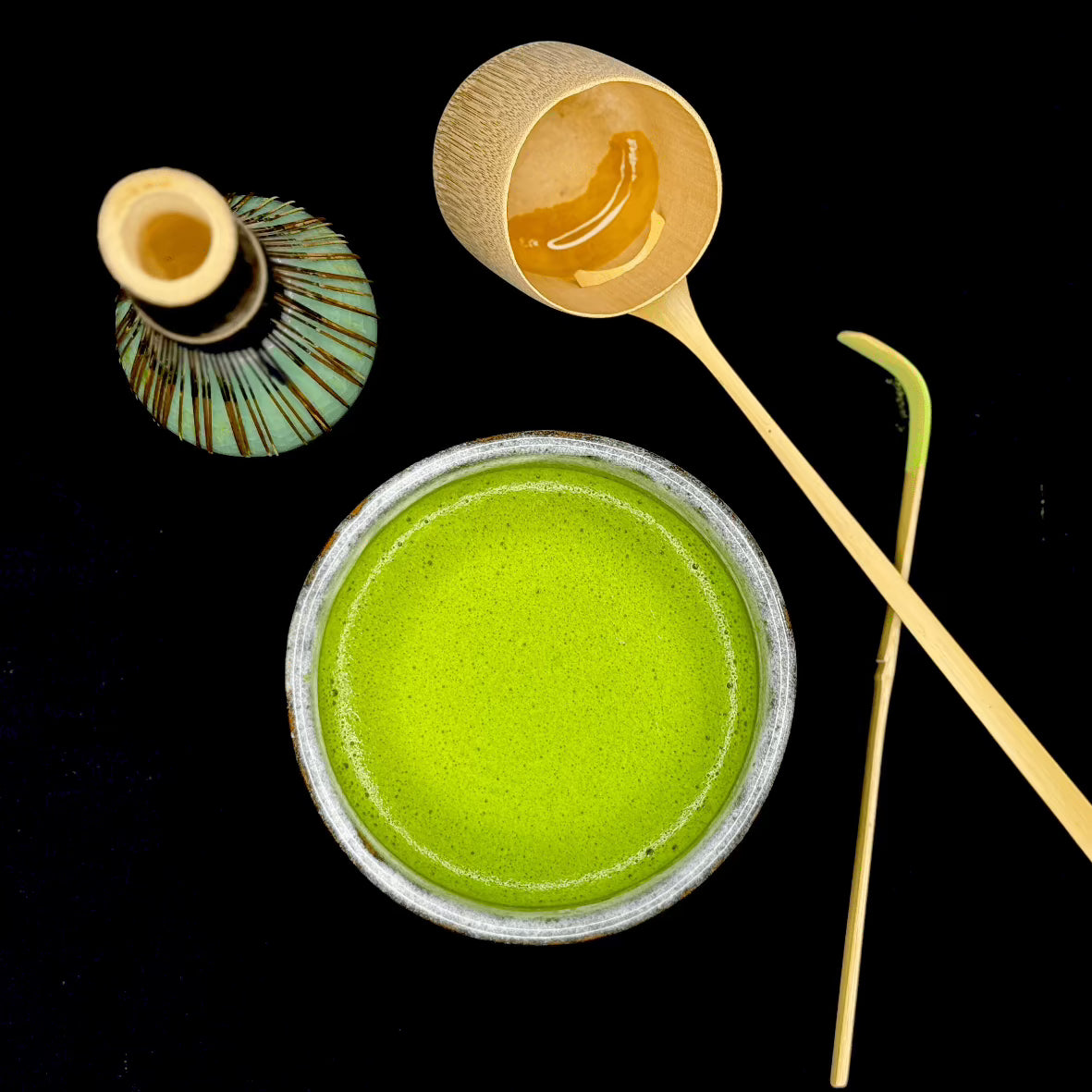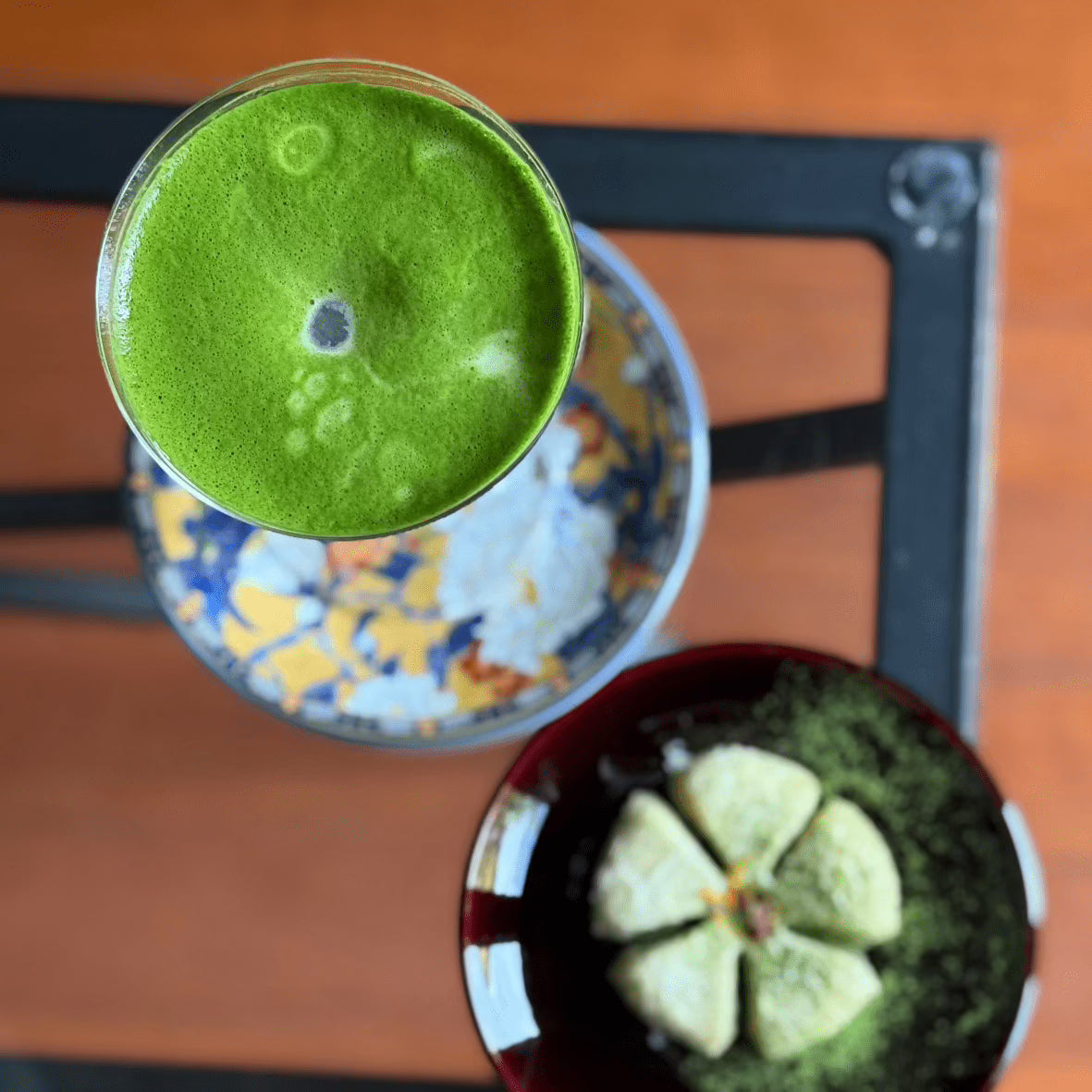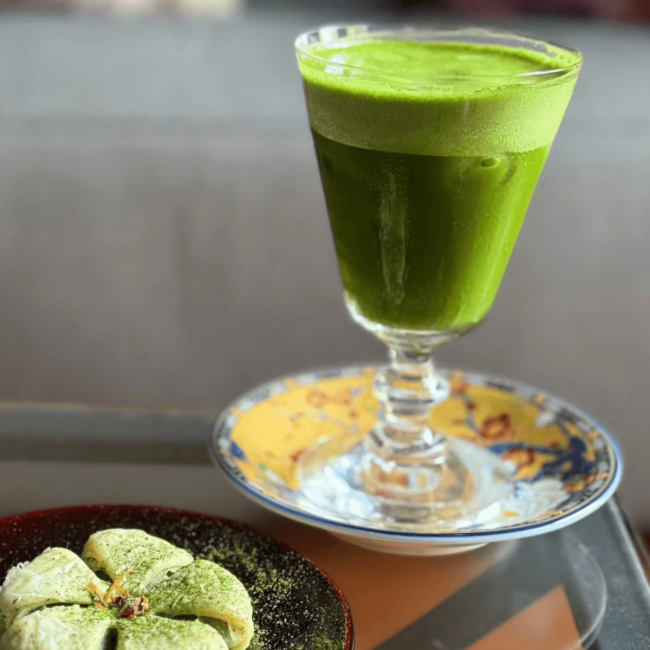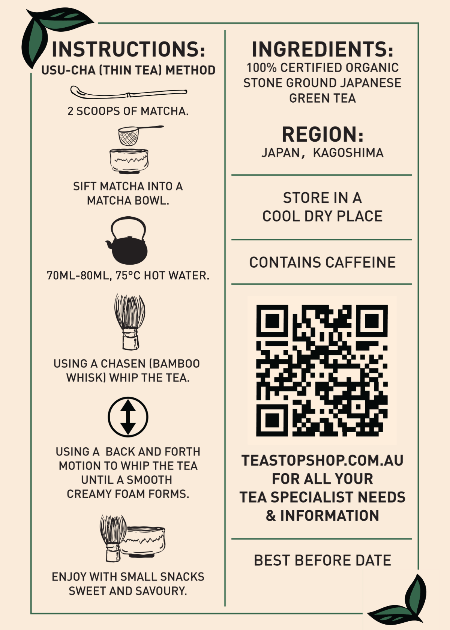
Is Matcha or Coffee Better for Focus and Energy?
Share
In today's fast-paced world, many people turn to caffeinated beverages like matcha and coffee to boost energy and focus. Both drinks have earned a loyal following, each praised for its unique qualities and benefits.
Matcha is a finely ground powder made from specially grown and processed green tea leaves. It offers a mindful energy experience rooted in centuries-old Japanese tradition.
Coffee, on the other hand, is known worldwide for its strong flavor and quick energizing effects. It is often enjoyed as a morning ritual or an afternoon pick-me-up.
Understanding the differences between matcha and coffee can help us grasp their distinct effects on energy and focus. By looking into factors such as caffeine content, additional compounds, and health benefits, we can make informed choices that align with our personal needs and wellness goals.

Understanding Caffeine Content in Matcha and Coffee
Caffeine content in matcha and coffee varies, shaping the energy and focus experienced from each cup. Matcha caffeine levels typically range from 40–90 mg per 2g serving, depending on the grade and preparation method. In contrast, coffee caffeine levels are usually higher, 70–140 mg per 8-oz cup is a common range for drip-brewed coffee.
Caffeine Content Breakdown
Matcha
- 40–90 mg caffeine per 2g serving
- Consumed as a whole powdered leaf, meaning all the caffeine is ingested
Coffee
- 70–140 mg caffeine per 8 oz cup
- Caffeine extracts into water, influenced by brewing time, grind size, and bean variety
Espresso
About 60–80 mg caffeine per standard shot (30 ml)—small but concentrated
Brewing style has a direct impact on caffeine extraction. Longer steeping or brewing times increase the caffeine concentration in both beverages. With matcha, since the entire leaf is consumed, its effects are both robust and steady compared to filtered coffee.
Recognizing these differences in caffeine content, matcha versus caffeine content coffee helps tailor your beverage choice to your desired energy rhythm. This sets the stage for exploring how each drink shapes alertness, calmness, and mental clarity.
How Matcha and Coffee Affect Energy and Focus Differently
Coffee's Rapid Energy Spike
Coffee provides an immediate energy boost, thanks to its higher caffeine content. This surge in alertness can be invigorating but often comes with a downside—a potential crash after the peak effects wear off. Many coffee drinkers experience jitters, increased heart rate, and sometimes anxiety due to this rapid energy spike.
Matcha's Sustained Energy Release
Matcha offers a more balanced approach to boosting energy. The combination of caffeine and L-theanine in matcha results in a slower, sustained energy release. L-theanine promotes calm focus, counteracting the jittery side effects often associated with coffee. This harmonious blend supports mental clarity and prolonged concentration without the common pitfalls of heightened anxiety.
Comparing Mental Clarity Benefits
While both beverages enhance mental clarity, matcha’s unique profile, driven by L-theanine, makes it ideal for those seeking a mindful, steady focus. Coffee may be suitable for tasks requiring immediate alertness, but it lacks the calming elements that make matcha a thoughtful choice for sustained cognitive performance.
The Role of L-Theanine in Matcha for Balanced Focus
L-theanine is a unique amino acid found almost exclusively in Camellia sinensis—the tea plant—most notably in shade-grown Japanese matcha. Unlike the sharp stimulation often associated with coffee, L-theanine works synergistically with caffeine to create a state of calm alertness known as “zanshin” in Japanese tradition.
L-theanine benefits include:
- Promoting relaxation without drowsiness
- Mitigating the spike-and-crash effect common with other caffeinated drinks
- Supporting the brain’s alpha waves, which are linked to mental clarity and creative focus
Studies suggest this compound not only reduces stress but also enhances memory, learning, and cognitive performance. For those sensitive to caffeine or prone to anxiety, matcha’s unique balance offers a gentle uplift, providing cognitive enhancement without jitters. This harmony between stimulation and serenity is what sets calm focus matcha apart in the matcha vs coffee conversation. The presence of L-theanine shapes matcha into a mindful ally for sustained productivity and tranquility.
Health Benefits Beyond Energy: Matcha vs Coffee
Antioxidant Profiles: EGCG in Matcha vs General Antioxidants in Coffee
Both matcha and coffee are rich sources of antioxidants, but their profiles differ significantly. Matcha boasts high levels of epigallocatechin gallate (EGCG), a potent antioxidant known for its cancer-fighting properties and ability to reduce inflammation. In contrast, coffee contains a diverse range of antioxidants, including chlorogenic acid, which contributes to its anti-inflammatory and neuroprotective effects.
Metabolic Benefits: Fat Oxidation and Appetite Suppression
Matcha and coffee can both enhance metabolism, promoting fat oxidation and aiding in weight management. Matcha is particularly effective due to the combination of caffeine and catechins like EGCG, which boost thermogenesis (calorie burning). Coffee also stimulates metabolic rate through its high caffeine content, helping with appetite suppression.
Gut Health Considerations with Matcha and Coffee Consumption
Acidity Differences
Coffee tends to be more acidic than matcha, potentially leading to stomach irritation or acid reflux in sensitive individuals. Matcha is gentler on the gut microbiome, making it a better choice for those with digestive issues.
Gut-Friendly Properties
The polyphenols in matcha support healthy gut bacteria, contributing to improved digestion and overall gut health.
Cardiovascular Benefits: Improved Circulation and Cholesterol Reduction
Matcha offers additional cardiovascular benefits by improving blood circulation and reducing LDL cholesterol levels. The potent catechins in matcha help maintain arterial health and support heart function. While coffee also has cardiovascular benefits, such as lowering the risk of certain heart diseases when consumed in moderation, the higher acidity might be a concern for some individuals.
Choosing Between Matcha and Coffee Based on Personal Needs
When deciding between matcha and coffee, it's important to think about several factors that relate to your preferences and needs:
1. Sensitivity to Caffeine
If you're prone to jitters or anxiety, matcha may be a gentler option because it contains both caffeine and calming L-theanine. On the other hand, coffee has a higher caffeine content, which can lead to a quick boost in energy but might also make you feel nervous.
2. Energy Requirements
If you need an immediate energy boost, like for early morning activities or intense tasks, coffee might be a good choice. However, if you're looking for steady energy throughout the day, matcha is better as it provides calm energy for long periods of focus.
3. Health Considerations
Acid Reflux/Gut Sensitivity
Coffee's acidity can irritate the stomach, especially for people with acid reflux. In contrast, matcha is less acidic and generally easier on the digestive system.
4. Lifestyle Preferences
Taste
Your personal taste preference is important here. Coffee has a strong flavor, while matcha has earthy, green notes.
Ritual
The traditional way of making matcha involves using tools like the chasen (whisk), which adds a meditative element to the process and promotes mindfulness.
By understanding these factors, you can make a more informed decision between matcha and coffee based on your individual needs and lifestyle.

Brewing Tips to Maximize Benefits from Matcha and Coffee
Optimal Brewing Methods for Green Tea/Matcha and Coffee Lovers Alike
Optimal Water Temperatures
Green Tea/Matcha: To preserve the delicate flavors and maximize the health benefits, green tea and matcha should be brewed at a temperature between 70–80°C. Using water that is too hot can result in a bitter taste and diminish the subtle nuances of the tea.
Coffee: Different brewing methods require varying temperatures. For drip coffee, aim for water between 90–96°C. Espresso machines typically heat water to about 93°C, allowing for optimal extraction and flavor.
Steeping Times Affecting Flavor and Caffeine Extraction
Green Tea/Matcha: Matcha does not steep like traditional teas; instead, it is whisked into hot water until frothy. However, if you're brewing loose-leaf green tea, a steeping time of 2–3 minutes is ideal to extract flavor without over-brewing, which can lead to bitterness.
Coffee: Steeping times vary widely:
- French Press: Typically requires 4 minutes of steeping time to balance richness and smoothness.
- Pour Over: Varies but generally takes around 3–4 minutes, depending on grind size and method.
- Cold Brew: Requires significantly longer steeping times—often 12–24 hours—to create a smooth, low-acidity beverage.
Using Proper Tools to Enhance Your Tea Experience
Using proper tools can elevate your tea ritual:
- Matcha Whisk (Chasen): A traditional bamboo whisk essential for achieving the perfect frothy texture in your matcha.
- Matcha Bowl (Chawan): Designed to accommodate vigorous whisking while maintaining proper temperature.
By understanding these optimal brewing methods and utilizing appropriate tools, you ensure that each cup of matcha or coffee delivers its full potential in flavor and health benefits.
Using Proper Tools to Enhance Your Tea Experience
Using the right tools is essential for elevating your matcha and coffee rituals. For matcha, a traditional whisk (chasen) is indispensable. This bamboo tool is designed to blend the powdered tea seamlessly with water, creating a smooth, frothy texture that enhances both flavor and experience.
Brewing Matcha Tips:
- Chasen Whisk: Invest in a quality, handcrafted bamboo chasen for an authentic preparation.
- Matcha Bowl (Chawan): Use a wide, ceramic bowl to allow ample space for whisking.
- Matcha Scoop (Chashaku): Measure the perfect amount of matcha with this slender scoop.
- Water Temperature: The Ideal range is between 70–80°C to preserve the delicate flavors and nutrients.
For coffee enthusiasts, ensuring precision in brewing methods can significantly impact the outcome:
Brewing Coffee Tips:
- Quality Coffee Grinder: Grind beans just before brewing to maintain freshness and aroma.
- Brewing Methods: Experiment with various techniques such as pour-over, French press, or espresso machines.
- Water Temperature: Optimal brewing temperature is around 90–96°C to extract full-bodied flavors without bitterness.
The importance of quality sourcing cannot be overstated. Premium organic matcha from Tea Stop Shop offers unparalleled purity and taste, cultivated through centuries-old Japanese traditions. Choosing high-quality tools enhances not only the preparation process but also maximizes the energy and focus benefits derived from your tea or coffee ritual.
Best Matcha Powder for Mental Clarity and Energy Support
Understanding Different Matcha Grades Available In The Market
When it comes to achieving optimal mental clarity and energy support, selecting the right matcha powder is crucial. Matcha is available in various grades, each with its unique characteristics and benefits.
1. Ceremonial Grade AAA Matcha
This grade is considered the highest quality matcha available. It is produced using the youngest tea leaves, which are carefully hand-picked and stone-ground into a fine powder. Ceremonial grade matcha boasts a vibrant green color, a smooth texture, and a naturally sweet flavor, making it ideal for traditional Japanese tea ceremonies. When consumed, it provides a clean energy boost and enhances mental clarity without causing jitters or crashes.
2. Premium Grade Matcha
Slightly lower in quality than ceremonial grade, premium grade matcha is still an excellent choice for daily consumption. It is made from slightly older tea leaves, which results in a less intense green color and a slightly stronger taste compared to ceremonial grade. Premium grade matcha offers many of the same benefits, including sustained energy release and improved focus, though its flavor profile may be more robust.
Why Choosing Small-Batch Organic Products Matters For Optimal Cognitive Support
Opting for small-batch organic matcha products ensures that you are consuming the purest and most potent form of this wonderful tea. Here's why:
- Purity: Small-batch production allows for greater control over quality. Organic practices ensure that no synthetic pesticides or fertilizers are used, preserving the natural integrity of the tea leaves.
- Freshness: Small batches mean that matcha is processed in limited quantities, ensuring that you receive fresher products with higher nutrient content.
- Environmental Sustainability: Organic farming methods reduce environmental impact by promoting biodiversity and soil health. By choosing organic matcha, you are supporting sustainable practices that benefit both the planet and your well-being.
- Enhanced Cognitive Support: Organic matcha retains more antioxidants and beneficial compounds such as L-theanine. These elements work synergistically to enhance mental clarity, memory function, and overall cognitive health.
For those seeking the best matcha powder for mental clarity, premium organic ceremonial grade AAA from Tea Stop Shop is an exceptional choice. Our commitment to sourcing from ethical, organic tea gardens ensures that every cup of matcha provides unparalleled purity, aroma, and flavor.
By integrating high-quality matcha into your daily routine, you can experience improved focus, sustained energy levels, and a sense of calm mindfulness—qualities essential for navigating life's challenges with intention and grace.
Why Choosing Small-Batch Organic Products Matters For Optimal Cognitive Support
Choosing small-batch, premium organic matcha AAA—sourced from Japan’s most revered tea fields and certified organic—makes a meaningful difference for mental clarity and energy. Top-grade Japanese ceremonial matcha is shade-grown, stone-milled, and handled with care in every step. This protects delicate L-theanine and antioxidant content, supporting smoother focus without the harshness sometimes felt with coffee.
The Benefits of Small-Batch Organic Matcha
- Purity: Free from additives and pesticides for cleaner nourishment.
- Freshness: Hand-blended in small batches for peak flavor and potency.
- Tradition: Honours centuries-old Japanese practices, connecting your daily ritual to a deeper heritage.
For those seeking the best matcha powder for mental clarity, thoughtfully sourced products like those at Tea Stop Shop embody quality, sustainability, and cognitive support in every cup.
Conclusion
The choice between matcha vs coffee depends on the unique needs and preferences of each individual. Some people prefer the quick boost of energy from coffee, which helps them stay alert in the mornings or during important tasks. On the other hand, some appreciate the balanced energy of matcha, with its combination of gentle uplift and calming effect, especially those who practice mindfulness or prefer a more relaxed approach to staying focused.
When making this decision, it's important to consider:
- Caffeine Sensitivity: If you tend to experience jitters or crashes from caffeine, matcha's profile with L-theanine may provide a smoother experience.
- Desired Energy Curve: Coffee gives an immediate burst of energy, while matcha promotes sustained attention and calm alertness.
- Digestive Comfort: People with sensitive stomachs often find relief in matcha's lower acidity and gut-friendly properties.
- Ritual and Taste: The mindful preparation of matcha can become a cherished ritual, bringing intention and pause into your day.
Both beverages can support well-being when chosen mindfully and within personal limits. By selecting high-quality organic teas from reputable sources like Tea Stop Shop, you not only nourish your body but also honor the environment and ancient traditions. Each cup becomes an opportunity to cultivate presence, vitality, and conscious living—one mindful sip at a time.
